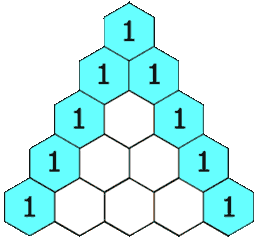118. Pascal’s Triangle
Description
Given an integer numRows, return the first numRows of Pascal’s triangle.
In Pascal’s triangle, each number is the sum of the two numbers directly above it as shown:

Example 1:
- Input: numRows = 5
- Output: [[1],[1,1],[1,2,1],[1,3,3,1],[1,4,6,4,1]]
Example 2:
- Input: numRows = 1
- Output: [[1]]
Constraints:
- 1 <= numRows <= 30
Submitted Code
class Solution(object):
def generate(self, numRows):
"""
:type numRows: int
:rtype: List[List[int]]
"""
output = [] # 최종 출력
for row in range(numRows): # 각 행을 차례로 순환
row_list = [] # 행의 원소를 담는 리스트(다음 행을 만들기 전에 항상 초기화)
for col in range(row + 1): # 행의 원소를 차례로 순환
if col == 0 or col == row: # 행의 첫 번째(col == 0)와 마지막(col == row)은 1
row_list.append(1)
else:
row_list.append(output[row-1][col-1] + output[row-1][col]) # 바로 위 행의 두 항목 합
output.append(row_list) # 완성된 행을 최종 결과 리스트에 추가
return output
Runtime: 0 ms | Beats 100.00%
Memory: 12.49 MB | Beats 51.71%
파스칼의 삼각형 문제를 c++로 본 적이 있어서 금방 풀 수 있었다. 코드로 구현할 때는 삼각형을 가운데 정렬한 것보다 왼쪽으로 정렬했을 때가 더 이해하기 쉬운 것 같다.
numRows = 5
[
numRows=1, output[0] [1],
numRows=2, output[1] [1, 1],
numRows=3, output[2] [1, 2, 1], output[1][0] + output[1][1] = 1+1 = 2
numRows=4, output[3] [1, 3, 3, 1],
numRows=5, output[4] [1, 4, 6, 4, 1]
]
output = [[1],[1,1],[1,2,1],[1,3,3,1],[1,4,6,4,1]]
Other Solutions
1st
class Solution:
def generate(self, numRows: int) -> List[List[int]]:
res = [[1]] # 첫 번째 행
for _ in range(numRows - 1): # 두 번째 행부터 시작
dummy_row = [0] + res[-1] + [0] # 이전 행에 0을 양쪽에 추가한 새로운 더미 행 생성
row = [] # 현재 행 저장
for i in range(len(res[-1]) + 1):
row.append(dummy_row[i] + dummy_row[i+1]) # 두 인접 항목을 더해서 새로운 항목 생성
res.append(row)
return res
time complexity: 𝑂(𝑛2)
space complexity: 𝑂(𝑛2)
각 행의 맨 앞과 맨 뒤에 0을 더한다는 아이디어를 사용한 답안이다. 0은 1에 더해도 그대로 1이 되기 때문에 결과에 전혀 영향을 주지 않고, 두 인접 항목을 더하는 연산을 일괄 적용할 수 있다.
2nd
class Solution:
def generate(self, numRows: int) -> List[List[int]]:
if numRows == 0:
return []
if numRows == 1:
return [[1]]
prevRows = self.generate(numRows - 1) # 이전 행을 재귀호출
newRow = [1] * numRows # 새 행 생성
for i in range(1, numRows - 1):
newRow[i] = prevRows[-1][i - 1] + prevRows[-1][i] # 중간 요소들 계산
prevRows.append(newRow) # 현재 행을 추가
return prevRows # 현재까지 완성된 전체 목록 반환
재귀 호출을 이용한 방법



Leave a comment